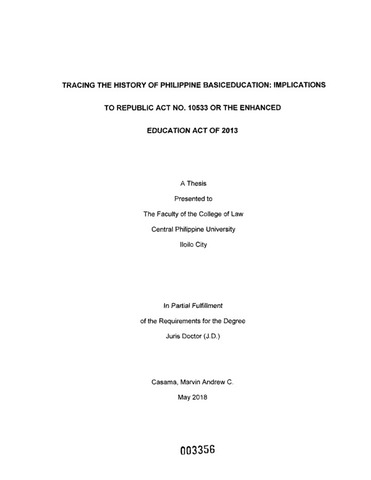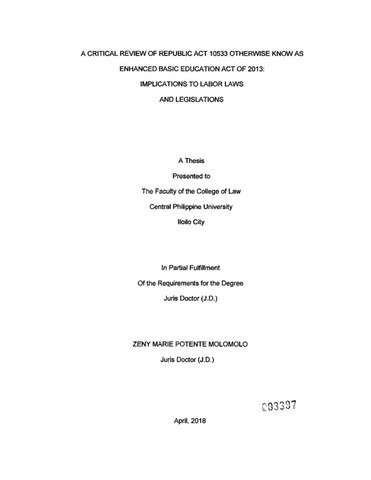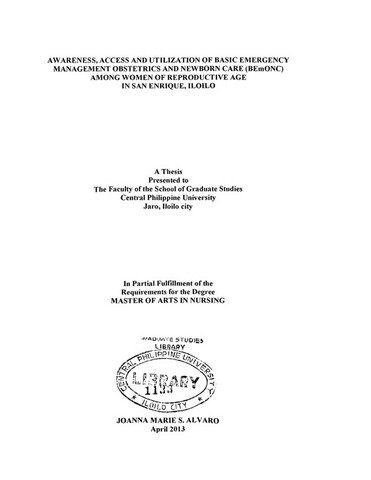Tracing the history of Philippine basic education: Implications to Republic Act No. 10533 or the Enhanced Education Act of 2013
| dc.contributor.adviser | Alibogha, Salex E. | |
| dc.contributor.author | Casama, Marvin Andrew C. | |
| dc.coverage.spatial | Philippines | en_US |
| dc.date.accessioned | 2021-07-01T02:37:45Z | |
| dc.date.available | 2021-07-01T02:37:45Z | |
| dc.date.issued | 2018 | |
| dc.identifier.citation | Casama, M. A. C. (2018). Tracing the history of Philippine basic education: Implications to Republic Act No. 10533 or the Enhanced Education Act of 2013 (Unpublished postgraduate thesis). Central Philippine University, Jaro, Iloilo City. | en_US |
| dc.identifier.uri | https://hdl.handle.net/20.500.12852/1144 | |
| dc.description | Abstract only | en_US |
| dc.description.abstract | This qualitative study is aimed to trace the History of Philippine Basic Education with implications to the Enhanced Education Act of 2013. It is also aimed to determine the possible effect of the MTB-MLE implementation in schools. Qualitative Historical research and Content analysis were used in this study to determine the changes that happened overtime to the Philippine Basic Education. The researcher followed five steps in applying Historical Research as method for this study. Result showed that there are a lot of changes in structure and education itself in the past century in the history of Philippine Education. As for reference, the researcher used the country of Vietnam as a model for this research as the history of their education is closely related to that of the Philippines, they just reformed earlier, as the Philippines reform came about 20 years after. During the 19th century, Spain was the first to decree education reform in the Philippines, it was followed by the Americans and Japanese, thus, our basic education system is influence by three cultures, the Spanish, American and Japanese. Each of the occupants had their own system of education implemented, which the Philippines was able to adopt. Just recently, in the year 2000s, there two major reform in Philippine Basic education. First, was the inclusion of kindergarten as part of the basic education in the Philippines by making it mandatory before entering grade 1. It can also be concluded that the enactment of Enhanced Education Act of 2013 is prompted by the provision of the Constitution. The poor educational standard in the Philippines, contributed to transform the Philippine Basic Education same with other countries, adopting the k-12 system. However, the biggest factor of the reforms in education was not statistic nor the growth society, but, in can be inferred that these reforms was because of the current administration the Philippines had during the changes. In the Pnoy administration, there are at least 6 laws passed with changes or added something with the basic education, the major changes were the mandatory kindergarten through Kindergarten act of 2011 and the increase of basic education years from 10 years to 12 years through the Enhanced Education Act of 2013. The major reform in the Philippines was as can be seen by the peoples naked eye, as the government failed to show the reason for these changes. The public had a notion that these changes was due only to the fact that other countries have K-12 system, but they failed to see the reasons, statistically, that our basic education system is not working for the improvement of students. Recommendations were made specifically to improve facilities through the increase of funding for education, specifically, the spending per student because Philippines has the lowest spending per student in the Southeast Asia. | en_US |
| dc.format.extent | vii, 74 leaves | en_US |
| dc.language.iso | en | en_US |
| dc.rights | Attribution-NonCommercial-NoDerivs 3.0 Philippines | * |
| dc.rights.uri | http://creativecommons.org/licenses/by-nc-nd/3.0/ph/ | * |
| dc.subject.ddc | Law Library 340.72 C263 | en_US |
| dc.subject.lcsh | Education | en_US |
| dc.subject.lcsh | Education--History | en_US |
| dc.subject.lcsh | Education--Philippines--History | en_US |
| dc.subject.lcsh | History | en_US |
| dc.subject.lcsh | Basic education | en_US |
| dc.subject.lcsh | Basic education--History | en_US |
| dc.subject.lcsh | Basic education--Law and legislation | en_US |
| dc.subject.lcsh | Educational law and legislation | en_US |
| dc.subject.lcsh | Philippines | en_US |
| dc.title | Tracing the history of Philippine basic education: Implications to Republic Act No. 10533 or the Enhanced Education Act of 2013 | en_US |
| dc.type | Thesis | en_US |
| dc.description.bibliographicalreferences | Includes bibliographical references | en_US |
| dc.contributor.chair | Bedona, Zacarias D. Jr. | |
| dc.contributor.department | College of Law | en_US |
| dc.description.degree | Juris Doctor | en_US |
| local.subject | Enhanced Basic Education Act of 2013 | en_US |
| local.subject | RA 10533 | en_US |
| local.subject | K-12 | en_US |
Files in this item
This item appears in the following Collection(s)
-
Juris Doctor [144]






